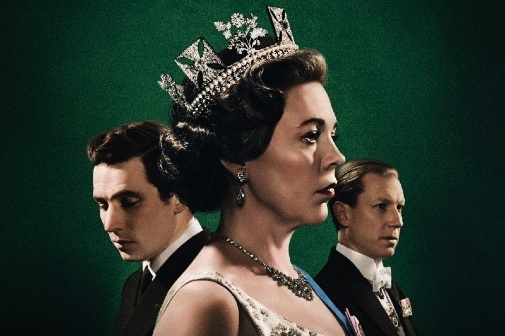by Cláudio Alves

Why do we, as an audience, love to see celebrities playing other celebrities? Just look at the history of the acting categories of the Oscars to see this love in full bloom. Every year, they are invaded by biopics with famous actors imitating the look, feel, ticks, sound, and accents of other figures in the public consciousness. Perhaps it's got something to do with the juxtaposition of two famous personas, neither fully erasing the other. It’s a palimpsest of acting.
We know the Queen of England, how she sounds and how she looks. When an actress plays her, their transformation becomes obvious because it calls attention to the art of pretending, but also to what is specific about the pretender in the first place. By watching Olivia Colman play the Queen in The Crown, it becomes obvious what makes Olivia Colman so special...

Of course, in this instance, the comparison isn't just to the Queen herself, but also Claire Foy's version of the role.
To put it bluntly, Colman never disappears in the role and she doesn't fully convince as an older version of Foy either. However, she gives us her interpretation, delineating new facets that the first seasons didn't dare show. For one, this monarch is often ridiculous, her po-faced solemnity easily read as absurd majesty. Foy rarely allowed us to find humor in her Elizabeth, but Colman, a natural comedian, can't help herself.
That's not to say she's simply recycling old performances from her repertoire. Her coldness and vacant inexpression are something quite new for Colman. Honestly, one only realizes how elastic the actress' face usually is, after watching ten hours of her actively repressing such emotional transparency. If Foy played a Queen learning to be an icon rather than a woman, Colman plays a monarch that's learned and internalized that lesson. Before, we saw the character as a student, but now she's a master and a merciless teacher, too.
 Josh O'Connor's Charles is the main victim of such mercilessness and the actor is brilliant at creating a vision of entitled vulnerability. Having fallen in love with him in God's Own Country, it's startling to confront the difference here. The ability to emote with micro-expressions is still there, but now it's mixed with a sense of rarefied privilege and an astounding imitation of Charles's voice. Erin Doherty is also shockingly similar to Princess Anne, though my unfamiliarity with her other work might be responsible for that surprise.
Josh O'Connor's Charles is the main victim of such mercilessness and the actor is brilliant at creating a vision of entitled vulnerability. Having fallen in love with him in God's Own Country, it's startling to confront the difference here. The ability to emote with micro-expressions is still there, but now it's mixed with a sense of rarefied privilege and an astounding imitation of Charles's voice. Erin Doherty is also shockingly similar to Princess Anne, though my unfamiliarity with her other work might be responsible for that surprise.
Helena Bonham Carter, on the other hand, is deeply unconvincing as Princess Margaret, visually. It's still a great performance that earns its greatness from the way the actress subsumes her usual ticks and mannerisms. She sacrifices her free-spirited screen persona to create a crass brat, the frustrated victim of her family's heartlessness and her husband's hatred. She's playing someone perpetually narcotized by alcohol and resentment, someone that irradiates pain and the need to be the center of attention at all times.
Yes, the third season of The Crown is an acting showcase for all. Tobias Menzies, trapped in the series' most insufferable role, manages to find interesting ways to play Prince Phillip's midlife crisis. What somewhat surprises is the excellence of the recurring and guest players. Jason Watkins is one Josh O'Connor away from being the season's MVP, for instance. Even Geraldine Chaplin as Wallis Simpson, a character with little to do, makes the most of it, delivering some of that episode's best lines with withering sharpness.

The Crown's new season is available on Netflix.